Staff, thanks for reminding us about this thread. To be honest , I nearly forgot about it.
History of Poland in a pill - illustrated
3. Golden Age
We briefly discussed Baptism and Kings/Queens before and now it is time to move to Golden Age which mostly took place in 16th century. Poland was doing well militarily (Moscow Duchy still too weak to pose a real danger), economically and culturally.
Jan Kochanowski`s poetry has been a great read till today, especially Laments written after the death of his little daughter, Urszulka.
en.wikipedia.org/wiki/Laments_(Kochanowski)
Read their nice rendition into English here:
gutenberg.org/files/27179/27179-h/27179-h.htm
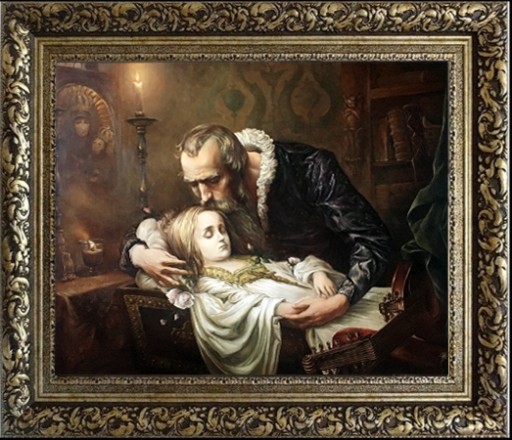
KOCHANOWSKINADZWLO.jpg
What year was this translation to English done? Could you perhaps provide an English translation of the following passage?
Wielkieś mi uczyniła pustki w domu moim,
Moja droga Orszulo, tym zniknieniem swoim!
Pełno nas, a jakoby nikogo nie było:
Jedną maluczką duszą tak wiele ubyło.
Tyś za wszytki mówiła, za wszytki śpiewała,
Wszytkiś w domu kąciki zawżdy pobiegała.
Wielkieś mi uczyniła pustki w domu moim,
Moja droga Orszulo, tym zniknieniem swoim!
Pełno nas, a jakoby nikogo nie było:
Jedną maluczką duszą tak wiele ubyło.
Tyś za wszytki mówiła, za wszytki śpiewała,
Wszytkiś w domu kąciki zawżdy pobiegała.
Could you perhaps provide an English translation of the following passage?
It is Lament No 8. Yes, it is a must on most school reading lists.
Check out that gutenberg site I provided:
Thou hast made all the house an empty thing,
Dear Ursula, by this thy vanishing.
Though we are here, 'tis yet a vacant place,
One little soul had filled so great a space.
For thou didst sing thy joyousness to all,
Running through every nook of house and hall.
[.....]
What year was this translation to English done?
VERSIFIED BY DOROTHEA PRALL
UNIVERSITY OF CALIFORNIA PRESS BERKELEY 1920
Sigismund Bell, the largest one in Poland for many centuries, was hung up in Wawel Cathedral in 1521.
Do you know it is wrongly called Sigismund`s Bell?
Once we talked about idiom : from the great bell, meaning rare special events.
en.wikipedia.org/wiki/The_Sigismund_Bell
Hanging by Matejko
Do you know it is wrongly called Sigismund`s Bell?
Once we talked about idiom : from the great bell, meaning rare special events.
en.wikipedia.org/wiki/The_Sigismund_Bell
Hanging by Matejko
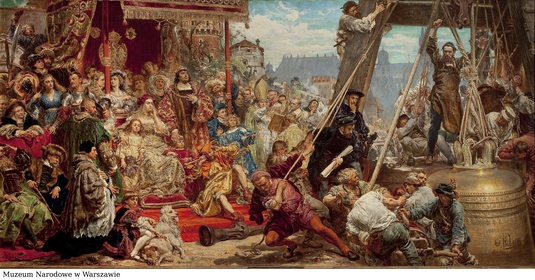
4740cc0a58e84fe292d4.jpg
The Golden Age came to its end at the beginning of the 17th century. Its final achievement was the occupation of Moscow by Polish troops which concluded with their defeat.
en.wikipedia.org/wiki/Polish%E2%80%93Muscovite_War_(1605%E2%80%931618)#Poles_in_Moscow_(1610)
The Poles surrender the Moscow Kremlin to Prince Pozharsky in 1612, painting by Ernst Lissner
en.wikipedia.org/wiki/Polish%E2%80%93Muscovite_War_(1605%E2%80%931618)#Poles_in_Moscow_(1610)
The Poles surrender the Moscow Kremlin to Prince Pozharsky in 1612, painting by Ernst Lissner
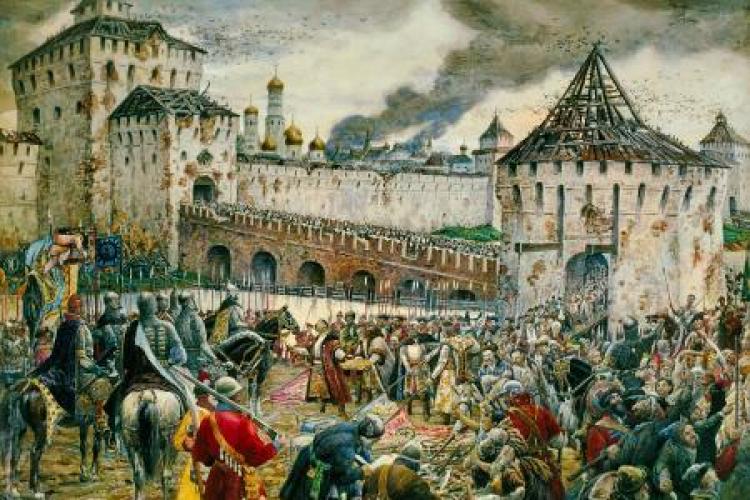
lissner.jpg
So far we briefly discussed 3 points
1. Baptism
2. Kings and queens
3. Golden Age
Now it is time for
4. Decline
It began in mid 17th century. Polish elites refused to introduce necessary reforms. There was a constant problem with collecting taxes and financing the regular army. Corrupt gentry and aristocracy played their dirty political games and disobeyed or openly revolted against their rulers. Invasions by foreign powers like Sweden or internal conflicts with Ukrainian cossacks brought about incredible destruction. Economy was mostly based on primitive work of peasants enslaved by their gentry owners - export of grain to Western Europe was Polish specialty. Kings couldn`t do much because of gentry`s ambitions - Parliament sessions were regularly disrupted and new laws were nullified with the use of Liberum Veto which allowed even a single parliament member to stop the legislature process. Those vetoers were often bribed by foreign countries.
The country was gradually going to the dogs, and its elites didn`t notice the rise of new powers, especially Russia under tsar Peter the Great. At the beginning of the 18th century, he and his armies were doing what they wanted in Poland and Lithuania.
Polish parliament called Sejm in 17th century
1. Baptism
2. Kings and queens
3. Golden Age
Now it is time for
4. Decline
It began in mid 17th century. Polish elites refused to introduce necessary reforms. There was a constant problem with collecting taxes and financing the regular army. Corrupt gentry and aristocracy played their dirty political games and disobeyed or openly revolted against their rulers. Invasions by foreign powers like Sweden or internal conflicts with Ukrainian cossacks brought about incredible destruction. Economy was mostly based on primitive work of peasants enslaved by their gentry owners - export of grain to Western Europe was Polish specialty. Kings couldn`t do much because of gentry`s ambitions - Parliament sessions were regularly disrupted and new laws were nullified with the use of Liberum Veto which allowed even a single parliament member to stop the legislature process. Those vetoers were often bribed by foreign countries.
The country was gradually going to the dogs, and its elites didn`t notice the rise of new powers, especially Russia under tsar Peter the Great. At the beginning of the 18th century, he and his armies were doing what they wanted in Poland and Lithuania.
Polish parliament called Sejm in 17th century
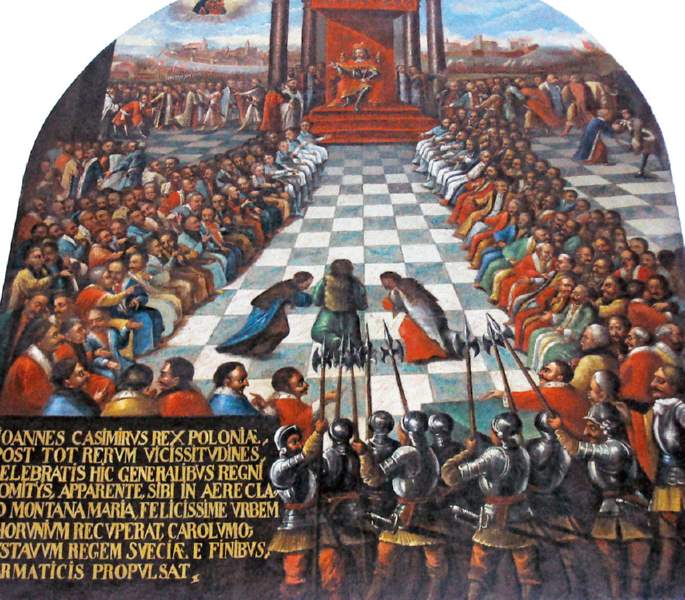
1.jpg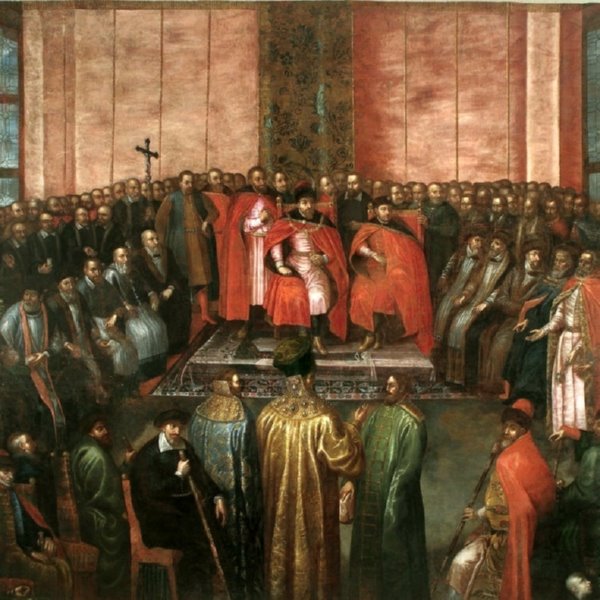
2.jpg
I wrote it in the Polish Mustard thread.
I wonder why and I think I know. Staropolski aka Old Polish refers to Poland which belongs to the past and is no more as it was. Today`s Poland is completely new.
What major changes took place which shaped modern Poland???
The partitions erased Poland for 123 years from the maps.
In 1918 Poland ceased being ruled by a monarch and became a republic.
In 1939 Poland was attacked and occupied by Germany and Soviet Russia which murdered large parts of the society, especially Jews and intelligentsia. Millions emigrated.
The territorial changes after the WW2 moved Poland to the West.
In post war period, aristocracy and nobility were destroyed by communists.
In 2004, Poland joined the European Union.
Anything else???
That is why the term Old Polish bears no connection with modern Poland.
Old Polish means a product reminding of the old times, excluding modernity.
I wonder why and I think I know. Staropolski aka Old Polish refers to Poland which belongs to the past and is no more as it was. Today`s Poland is completely new.
What major changes took place which shaped modern Poland???
The partitions erased Poland for 123 years from the maps.
In 1918 Poland ceased being ruled by a monarch and became a republic.
In 1939 Poland was attacked and occupied by Germany and Soviet Russia which murdered large parts of the society, especially Jews and intelligentsia. Millions emigrated.
The territorial changes after the WW2 moved Poland to the West.
In post war period, aristocracy and nobility were destroyed by communists.
In 2004, Poland joined the European Union.
Anything else???
That is why the term Old Polish bears no connection with modern Poland.
It is amasing to see how modern European institutions aka the EU are abundantly exploiting the liberum veto law during their major votings.
After centuries, old Polish lawmakers seem to have been doing the right thing. :)::):):)
After centuries, old Polish lawmakers seem to have been doing the right thing. :)::):):)
The country was gradually going to the dogs, and its elites didn`t notice the rise of new powers.
Let me finish the Decline section.
Poland was first partitioned by 3 neighbouring countries in 1772 because it was to weak to prevent it. It gave some food to patriotic Poles/Polesses who tried to introduce necessary reforms and cure the patient aka the state balancing on the verge of complete demise. They were successful to certain extent and they even declared the 3rd May Constitution, the second in the world. However, when Russians invaded to suppress the reformatic movement, the last King of Poland, let his name be cursed and forgotten, surrendered Polish troops led by patriotic general Kosciuszko and the state fell prey to the last , 3rd partition, between Russia, Prussia and Austria, in 1995.
PS. BTW, my parents always repeated to me - every patriotic Pole/Poless should remember those dates!!!! I believed in everything as a child and the history of Poland became my eternal hobby.
The famous painting (slightly remastered for children`s book) showing enthusiastic crowds applauding the declaration of May Constitution (which formally was a coup de tat) in 1992
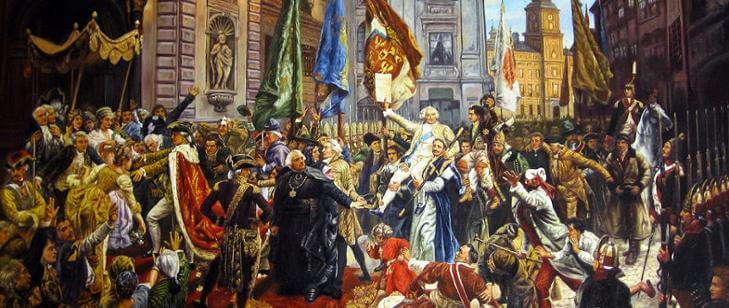
Konstytucja3maja7.jpg
1995.
What???
1795, of course. :):):)
